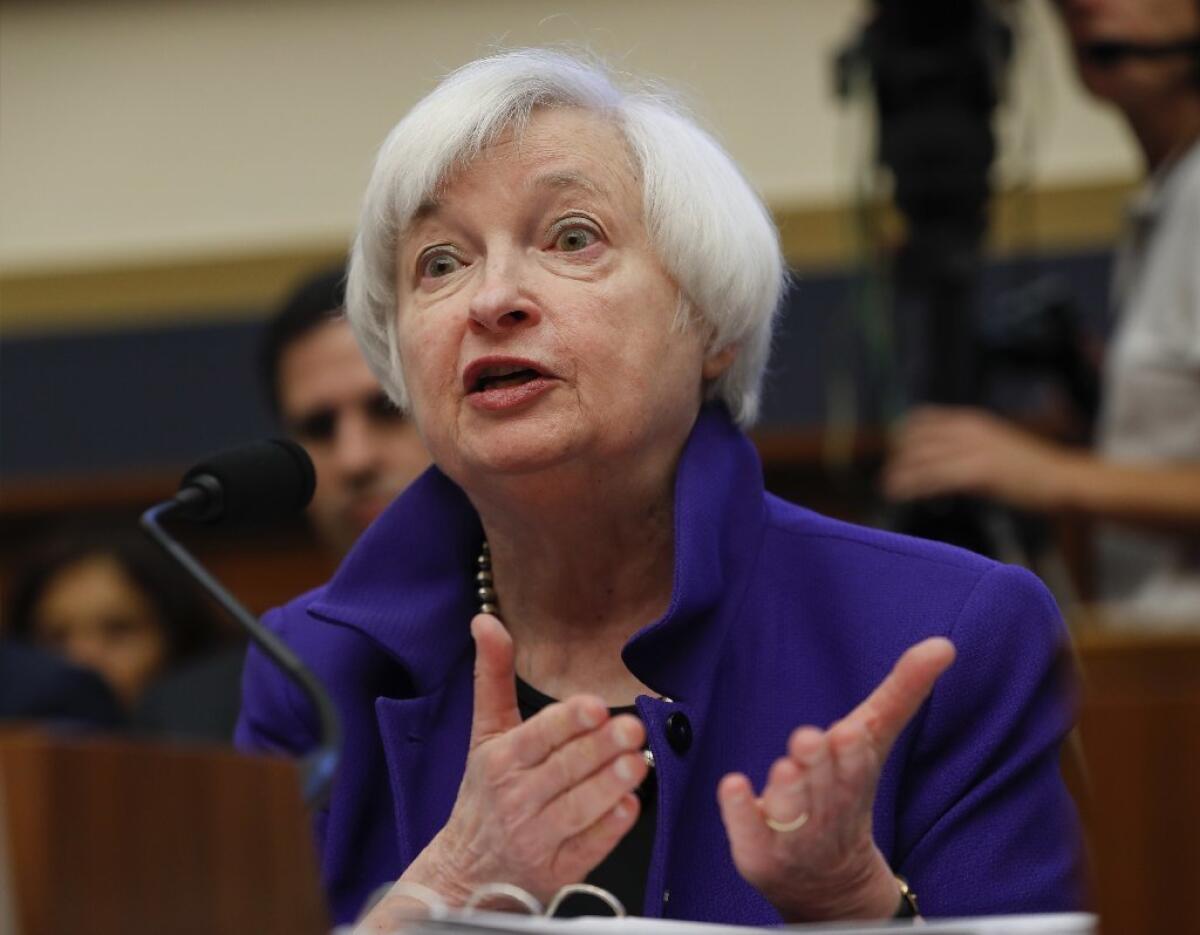Yellen affirms interest rate hike likely next month

- Share via
Reporting from Washington — Federal Reserve Chairwoman Janet L. Yellen gave a relatively upbeat assessment of the economy Thursday, further signaling a likely interest rate hike next month.
But she also noted that there is a “great deal of uncertainty” following the election and that she expected it would last for “some considerable time.”
In her first public statements about the economy since Donald Trump’s victory last week, Yellen did not talk specifically about the president-elect. Nor did she say that uncertainty, or the risks associated with it, had changed the Fed’s outlook on the economy or its plan on raising interest rates, at least for now.
With the labor market continuing to make progress and signs of rising inflation and wage gains recently, Yellen said at a congressional hearing that an increase in short-term interest rates “could well become appropriate relatively soon.”
She said that delaying a rate hike for too long could be detrimental for monetary policy and the economy. The Fed last raised its benchmark rate in December, and it stands at between 0.25% and 0.5%.
Behind shrinking middle-class jobs: A surge in outsourcing »
“Well, my own judgment is, looking at incoming economic data and developments thus far … the evidence we have seen since we [Fed policymakers] met in November is consistent with our expectation of strengthening growth and improving labor market, inflation moving up,” she told members of the Joint Economic Committee. “So we indicated that the case had strengthened for an increase in the federal funds rate and, to my mind, the evidence we’ve seen since that time remains consistent with the judgment the committee reached in November.”
Analysts widely expect a quarter-point rate increase at the Fed’s last scheduled meeting of the year, on Dec. 13 and 14. Yellen reiterated Thursday that future rate increases were likely to be gradual, but Trump’s election has raised market expectations for faster rate hikes in the months to come.
Like the Fed, private economists are waiting for clarity on how many of Trump’s campaign promises will be carried out, particularly the protectionist trade and restrictive immigration policies that Trump has advocated. For now, many businesses and investors are looking for somewhat stronger economic growth in the near term, as well as higher inflation and interest rates, as Trump and the incoming Republican-controlled Congress have raised prospects for sizable tax cuts and investments on infrastructure.
Stocks were up modestly Thursday.
Yellen agreed that markets are anticipating that Congress will push through a package injecting more money into the economy. But the Fed chair also cautioned lawmakers about the inflation and debt implications of such fiscal stimulus. The economy today is operating near full employment, she said, meaning large expansions of fiscal policies could be particularly inflationary.
She added that the “longer-run deficit problem needs to be kept in mind.” Noting that the ratio of debt to gross domestic product is about 77%, she said, “there’s not a lot of fiscal space should a shock to the economy occur, an adverse shock, that did require fiscal stimulus.”
Yellen, asked about statements from Trump’s camp to repeal the Dodd-Frank rules enacted after the financial crisis, said that would be a mistake. She said the law had made the financial system stronger and safer.
“We lived through a devastating financial crisis. And a high priority, I think, for all Americans should be that we want to see put in place safeguards through supervision and regulation that result in a safer and sounder financial system,” she said, citing the law’s tougher requirements for banks and derivatives, among other rules. “I think Dodd-Frank was very important in fostering those changes, and we should feel glad that our financial system is now operating on a safer and sounder footing.”
Yellen also pushed back on another initiative that is likely to gain impetus under the Trump administration — greater scrutiny over the Fed. Over the years, there have been various efforts, led by Republican lawmakers, to “audit” the Fed or have the central bank follow a set of principles or rules for determining monetary policy. But Yellen and her predecessor, Ben S. Bernanke, have argued that such legislation would be counterproductive and hurt the independence of the central bank.
“There is clear evidence of better outcomes in countries where central banks can take the long view, are not subject to short-term political pressures,” she said. “And sometimes central banks need to do things that are not immediately popular for the health of the economy. And we’ve really seen terrible economic outcomes in countries where central banks have been subject to political pressure.”
Yellen said that she fully intended to serve out her four-year term as Fed chair, through January 2018. During the campaign, Trump had sharply criticized Yellen’s performance, indicating he would most likely replace her.
Follow me at @dleelatimes
ALSO:
Reality check: Manufacturers returning to U.S. may mean jobs for robots, not people
Why this is the perfect time to invest in infrastructure, and why it probably won’t happen
Median incomes are up and poverty rate is down, surprisingly strong census figures show
UPDATES:
9:55 a.m.: This article was updated with additional comments from Yellen and additional background.
This article was originally published at 7:30 a.m.
More to Read
Inside the business of entertainment
The Wide Shot brings you news, analysis and insights on everything from streaming wars to production — and what it all means for the future.
You may occasionally receive promotional content from the Los Angeles Times.











